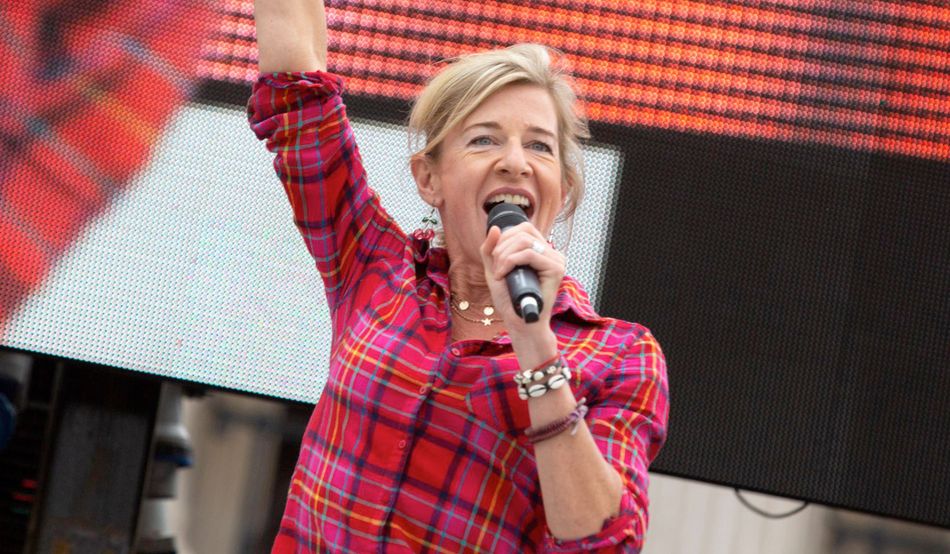“I think the common denominator is hope,” says Katie Hopkins’s husband and manager, Mark Cross, standing in front of the merch table at his wife’s comedy show. “The one common thread they all have is they believe in the best for each other… It’s almost spiritual.”
Securing a ticket for this, Hopkins’s third foray into stand-up, has been tricky. About half the stops on her Batshit Bonkers Britain tour are sold out. I am squeezed into Bethnal Green’s Backyard Comedy Club, which did not list the show on its website, referring to it instead as a “special event”.
Before the show I speak to a few of Hopkins’s fans about her appeal. “She says what she believes,” says Sue from Wanstead. “So many people are so woke nowadays, what’s the point in listening to them?” Her husband Richard adds: “Am I allowed to swear? She’s fucking awesome. Everything she says, we agree with. Everything.” (An exhaustive list of Hopkins’ controversial statements would take too long to detail here, but in 2017 she lost her presenting job at LBC after tweeting that a “final solution” was necessary after the terror attack at an Ariana Grande gig in Manchester. Everything!)
Almost all of the 300 people at the show are white, and several tell me they are Reform voters. One man wears a Make America Great Again hat. The average age seems around 50—Hopkins’s age. “She’s standing up for us,” says Kathy, a company director. “I think she’s bringing it to the attention that we’re actually being infiltrated by culture that’s not our own.”
After Geordie comic Cal Halbert warms up the crowd, Hopkins, in a shiny jacket and skirt, enters to Muse’s “Will of the People” (no coincidence, of course—she is a hard Brexiteer). The room is freezing cold—presumably because the venue can rely on being heated by the audience’s fury.
Hopkins’s announcer had enjoined us to “forget about the world outside”. Yet the world outside is the only thing that concerns Hopkins. After some opening bits about Bethnal Green being “98 per cent Pakistani Muslim”, Hopkins tells us she’s a “massive supporter of Israel”. Her husband’s hopeful words are obliterated within minutes. If she has a trademark bit, it is naming a category of people, then saying, “fuck off”.
Hopkins is performing live to tipsy 50-year-olds because, even by her husband’s admission, “she couldn’t work in the UK”. It is difficult to sustain a public media career that hinges entirely on trying to think of something to say that is even more inflammatory than what you said last week. Hopkins’s “final solution” remarks—which she eventually deleted—followed a trail of comments that often ended in court battles. Her fans, Hopkins says, have given her back her voice. “Your eyeballs are keeping me free,” she says.
In a series of low points, the Mariana Trench of Batshit Bonkers Britain comes just before the interval. Hopkins recently passed a speed awareness course, she says, after she hit someone in her car because their skin was too dark for her to see at night. The next part is hard to follow but she seems to sardonically imply that she knocked down this person, then turns to the audience and seems to say something like, “One less won’t hurt, will it?” It’s not clear what the joke is.
I ask a woman on my row what she thinks about this bit. She gets incensed and tells me that the NHS is in a terrible state but no one will say that it’s all because of immigrants and in the old days we all made fun of each other and young people have it so easy nowadays and in her neighbourhood immigrants are making everyone’s lives worse. One of the few non-white people there, a woman of Indian heritage, looks a little irritated and says, “If you ask me to justify it, I’m not going to. I’ve decided to come here and if I feel upset or offended by it, that’s on me. I’ve known real racism but racism that people perceive these days, it’s not real racism. It’s imagined.”
The evening becomes increasingly depressing. Hopkins claims that no one should broadcast their problems, then reminds everyone that she has epilepsy; she repeats the word “spaz”; and somehow appears to be glad that Steve Jobs, “died of Aids”. (He didn’t.) Then there is a revealing routine about how the world used to be better. In the 1960s and 1970s, Hopkins says, we all rubbed along fine. (1968 was, of course, the time of Enoch Powell’s “rivers of blood” speech.)
Here, about five minutes before the show is over, there is an exciting possibility that Hopkins might tell her first real joke. Invoking this sweet memory of the past, she says, “We were all straight back then, remember?” She has her tongue in her cheek for perhaps the first time. The problem is that her audience aren’t interested in a self-aware comment on an imagined past. They want real, undiluted nostalgia—because they think that everything was better in the old days: when those with disabilities weren’t on TV, people didn’t drive electric cars, and trans people kept quiet.
You could argue that Hopkins lost all right to mock anyone when she said on national TV that she doesn’t like children having geographical names, forgetting that she had called her own daughter “India”. But the reality is that, from a freezing cold room in Bethnal Green, the targets of Hopkins’s bile can’t get splashed by it. In many ways, they have won. Comedians who shock seem to endure, after all, largely because of the originality with which they make their points. Hopkins, by contrast, has little real originality and knows that her role is to play the pantomime villain. Her audience, by and large, do not know this. They believe in her. They see themselves in her. “I know you,” Hopkins says. “I see you. You are me.”
On the Tube I sit opposite a middle-aged couple who had been at the show. Like the vast majority of the crowd, they have had a great time. The man says that the British have a great sense of humour; we laugh about ourselves. “There wasn’t much laughing at ourselves tonight,” the woman says. “It was mostly laughing at other people.”










